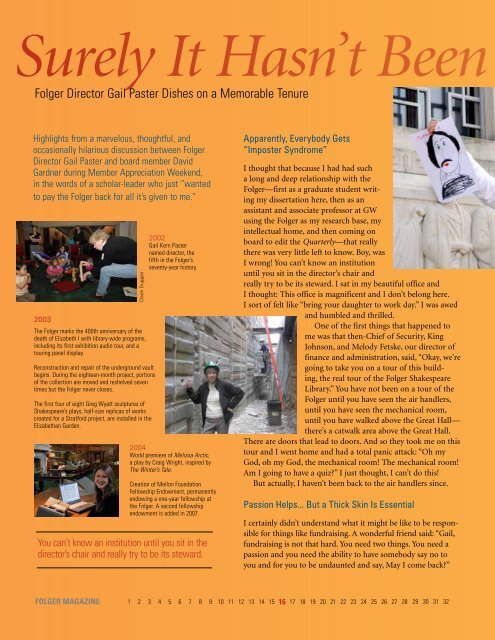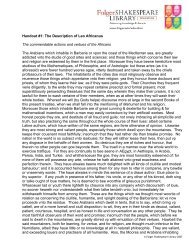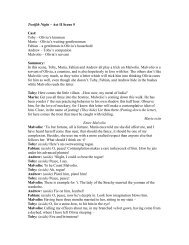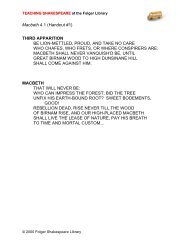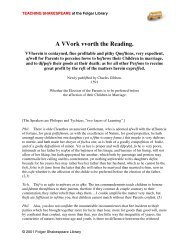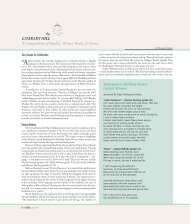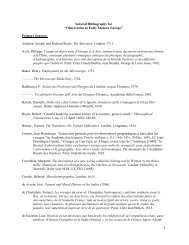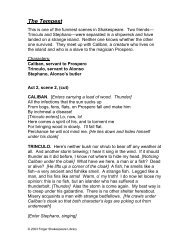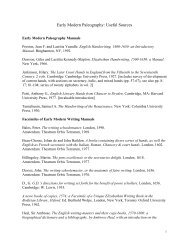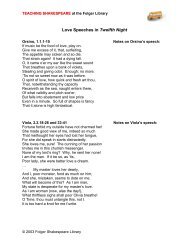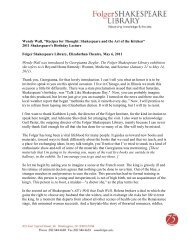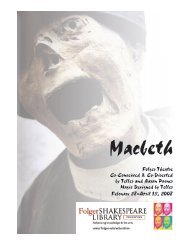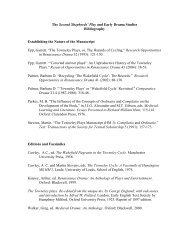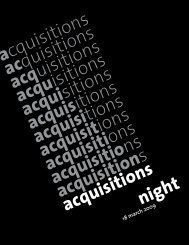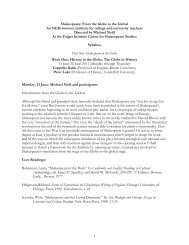Read the full story from the summer 2011 issue of the Folger Magazine
Read the full story from the summer 2011 issue of the Folger Magazine
Read the full story from the summer 2011 issue of the Folger Magazine
You also want an ePaper? Increase the reach of your titles
YUMPU automatically turns print PDFs into web optimized ePapers that Google loves.
Surely It Hasn’t Been<br />
<strong>Folger</strong> Director Gail Paster Dishes on a Memorable Tenure<br />
Highlights <strong>from</strong> a marvelous, thoughtful, and<br />
occasionally hilarious discussion between <strong>Folger</strong><br />
Director Gail Paster and board member David<br />
Gardner during Member Appreciation Weekend,<br />
in <strong>the</strong> words <strong>of</strong> a scholar-leader who just “wanted<br />
to pay <strong>the</strong> <strong>Folger</strong> back for all it’s given to me.”<br />
2003<br />
The <strong>Folger</strong> marks <strong>the</strong> 400th anniversary <strong>of</strong> <strong>the</strong><br />
death <strong>of</strong> Elizabeth I with library-wide programs,<br />
including its first exhibition audio tour, and a<br />
touring panel display.<br />
Reconstruction and repair <strong>of</strong> <strong>the</strong> underground vault<br />
begins. During <strong>the</strong> eighteen-month project, portions<br />
<strong>of</strong> <strong>the</strong> collection are moved and reshelved seven<br />
times but <strong>the</strong> <strong>Folger</strong> never closes.<br />
The first four <strong>of</strong> eight Greg Wyatt sculptures <strong>of</strong><br />
Shakespeare’s plays, half-size replicas <strong>of</strong> works<br />
created for a Stratford project, are installed in <strong>the</strong><br />
Elizabethan Garden.<br />
2002<br />
Gail Kern Paster<br />
named director, <strong>the</strong><br />
fifth in <strong>the</strong> <strong>Folger</strong>’s<br />
seventy-year hi<strong>story</strong>.<br />
2004<br />
World premiere <strong>of</strong> Melissa Arctic,<br />
a play by Craig Wright, inspired by<br />
The Winter’s Tale.<br />
Creation <strong>of</strong> Mellon Foundation<br />
Fellowship Endowment, permanently<br />
endowing a one-year fellowship at<br />
<strong>the</strong> <strong>Folger</strong>. A second fellowship<br />
endowment is added in 2007.<br />
You can’t know an institution until you sit in <strong>the</strong><br />
director’s chair and really try to be its steward.<br />
Claire Duggan<br />
Apparently, Everybody Gets<br />
“Imposter Syndrome”<br />
I thought that because I had had such<br />
a long and deep relationship with <strong>the</strong><br />
<strong>Folger</strong>—first as a graduate student writing<br />
my dissertation here, <strong>the</strong>n as an<br />
assistant and associate pr<strong>of</strong>essor at GW<br />
using <strong>the</strong> <strong>Folger</strong> as my research base, my<br />
intellectual home, and <strong>the</strong>n coming on<br />
board to edit <strong>the</strong> Quarterly—that really<br />
<strong>the</strong>re was very little left to know. Boy, was<br />
I wrong! You can’t know an institution<br />
until you sit in <strong>the</strong> director’s chair and<br />
really try to be its steward. I sat in my beautiful <strong>of</strong>fice and<br />
I thought: This <strong>of</strong>fice is magnificent and I don’t belong here.<br />
I sort <strong>of</strong> felt like “bring your daughter to work day.” I was awed<br />
and humbled and thrilled.<br />
One <strong>of</strong> <strong>the</strong> first things that happened to<br />
me was that <strong>the</strong>n-Chief <strong>of</strong> Security, King<br />
Johnson, and Melody Fetske, our director <strong>of</strong><br />
finance and administration, said, “Okay, we’re<br />
going to take you on a tour <strong>of</strong> this building,<br />
<strong>the</strong> real tour <strong>of</strong> <strong>the</strong> <strong>Folger</strong> Shakespeare<br />
Library.” You have not been on a tour <strong>of</strong> <strong>the</strong><br />
<strong>Folger</strong> until you have seen <strong>the</strong> air handlers,<br />
until you have seen <strong>the</strong> mechanical room,<br />
until you have walked above <strong>the</strong> Great Hall—<br />
<strong>the</strong>re’s a catwalk area above <strong>the</strong> Great Hall.<br />
There are doors that lead to doors. And so <strong>the</strong>y took me on this<br />
tour and I went home and had a total panic attack: “Oh my<br />
God, oh my God, <strong>the</strong> mechanical room! The mechanical room!<br />
Am I going to have a quiz?” I just thought, I can’t do this!<br />
But actually, I haven’t been back to <strong>the</strong> air handlers since.<br />
Passion Helps... But a Thick Skin Is Essential<br />
I certainly didn’t understand what it might be like to be responsible<br />
for things like fundraising. A wonderful friend said: “Gail,<br />
fundraising is not that hard. You need two things. You need a<br />
passion and you need <strong>the</strong> ability to have somebody say no to<br />
you and for you to be undaunted and say, May I come back?”<br />
FOLGER MAGAZINE 1 2 3 4 5 6 7 8 9 10 11 12 13 14 15 16 17 18 19 20 21 22 23 24 25 26 27 28 29 30 31 32
Nine Years Already ...<br />
By GARLAND SCOTT<br />
He said, “You have <strong>the</strong> passion, just<br />
develop <strong>the</strong> thick skin and you’ll be<br />
fine.” That was great advice.<br />
The Jangliness <strong>of</strong> Command<br />
When you’re an English pr<strong>of</strong>essor,<br />
you know where you’re going to be<br />
at 9:30 Tuesday morning because<br />
you’re going to be teaching your<br />
class. You have responsibility for<br />
your students and for <strong>the</strong> content<br />
<strong>of</strong> your lectures, <strong>the</strong>re’s committee<br />
service and <strong>the</strong>re’s seeing students<br />
outside <strong>of</strong> class. You are pretty much a solo practitioner. So<br />
it took some getting used to <strong>the</strong> rhythm <strong>of</strong> administration,<br />
which I think is a fifteen-minute interval. You can expect<br />
to be interrupted every fifteen minutes and you just sort <strong>of</strong><br />
get used to <strong>the</strong> jangliness <strong>of</strong> that rhythm. And now in fact<br />
when I don’t get interrupted every fifteen minutes I think:<br />
Okay, what’s <strong>the</strong> matter? Is something going wrong here?<br />
Claire Duggan<br />
Welcome to <strong>the</strong> <strong>Folger</strong>, Mind <strong>the</strong> Puddle<br />
What I didn’t know and wouldn’t know for a month, until<br />
we developed water in <strong>the</strong> rare book vault, was that <strong>the</strong><br />
<strong>Folger</strong> really needed very serious infrastructure renovation.<br />
I said to Melody Fetske, “Okay, I want to know everything<br />
that this building needs. I want to give it to <strong>the</strong> <strong>Folger</strong><br />
Board and <strong>the</strong>n we will decide what to do about it.” We<br />
handed <strong>the</strong> board a ten-page list <strong>of</strong> things that needed work<br />
and we set ourselves <strong>the</strong> goal—between that point, which<br />
was <strong>the</strong> fall <strong>of</strong> 2002, and our anniversary year <strong>of</strong> 2007—<strong>of</strong><br />
getting it done, and we did. I wanted <strong>the</strong> building to shine<br />
for <strong>the</strong> 75th anniversary and I think it really did. Of course,<br />
keeping it shining is a big problem.<br />
I did manage to get some amazingly generous federal<br />
support to help us when we had our leaks. I went to this<br />
wonderful Senator and said, “We have a world treasure<br />
here and we’re leaking!” I saw <strong>the</strong> Senator a couple <strong>of</strong> years<br />
after he’d really helped us and he said: “Madame Director, I<br />
haven’t seen you in a while. You must not have any leaks!”<br />
2005<br />
Dedication <strong>of</strong> <strong>the</strong> Babette<br />
Craven Art Vault, housing<br />
illustrations, photographs,<br />
porcelains, <strong>the</strong>atrical<br />
memorabilia, and small works<br />
<strong>of</strong> art.<br />
Charles, prince <strong>of</strong> Wales, and<br />
his wife Camilla, duchess<br />
<strong>of</strong> Cornwall, visit <strong>the</strong> <strong>Folger</strong>,<br />
attending a workshop with<br />
local public school children.<br />
The <strong>Folger</strong> Library Committee <strong>of</strong> <strong>the</strong> Amherst Board <strong>of</strong> Trustees becomes <strong>the</strong><br />
<strong>Folger</strong> Board <strong>of</strong> Governors on July 1, a significant change in governance.<br />
Lloyd Wolf<br />
2007<br />
The <strong>Folger</strong> Shakespeare Library celebrates its<br />
75th anniversary with <strong>the</strong> <strong>the</strong>me “Shakespeare in<br />
American Life.” A three-part radio documentary,<br />
narrated by Sam Waterston, is heard on more than<br />
200 US public radio stations and NPR Worldwide,<br />
and <strong>Folger</strong> <strong>Magazine</strong> makes its debut.<br />
The <strong>Folger</strong> is a really good example<br />
<strong>of</strong> <strong>the</strong> humanities in action.<br />
2006<br />
A new digital photography laboratory and<br />
<strong>the</strong> Werner Gundersheimer Conservation<br />
Laboratory mark major improvements in<br />
imaging and conservation <strong>of</strong> <strong>the</strong> collection.<br />
<strong>Folger</strong> Theatre joins in <strong>the</strong> citywide<br />
Shakespeare in Washington celebration<br />
with an all-Shakespeare schedule for <strong>the</strong><br />
2006-07 season.<br />
<strong>Folger</strong> Consort stages <strong>the</strong> early<br />
English drama The Second<br />
Shepherds’ Play, complemented<br />
by a <strong>Folger</strong> Institute conference.<br />
The play is <strong>the</strong> subject <strong>of</strong> <strong>the</strong><br />
first <strong>Folger</strong> podcasts.<br />
With funding <strong>from</strong> <strong>the</strong> Mellon<br />
Foundation, <strong>the</strong> library begins<br />
online cataloging <strong>of</strong> its <strong>full</strong><br />
56,000 manuscript collection.<br />
1 2 3 4 5 6 7 8 9 10 11 12 13 14 15 16 17 18 19 20 21 22 23 24 25 26 27 28 29 30 31 32 Summer <strong>2011</strong>
2009<br />
<strong>Folger</strong> acquires <strong>the</strong> largest painting<br />
in its collection, James Northcote’s<br />
Romeo and Juliet, which measures<br />
nine by eleven feet.<br />
<strong>Folger</strong> Education partners with PBS<br />
to create educational online content<br />
in conjunction with <strong>the</strong> airing <strong>of</strong> Sir<br />
Ian McKellen’s King Lear.<br />
<strong>2011</strong><br />
<strong>Folger</strong> Theatre’s Hamlet wins<br />
<strong>the</strong> Helen Hayes Award for<br />
Outstanding Resident Production.<br />
The Manifold Greatness<br />
exhibition, national traveling<br />
panel display, and website,<br />
developed with <strong>the</strong> Bodleian<br />
Library at Oxford, marks <strong>the</strong><br />
400th anniversary <strong>of</strong> <strong>the</strong><br />
publication <strong>of</strong> <strong>the</strong> King James<br />
Bible.<br />
The Old <strong>Read</strong>ing Room is<br />
renamed <strong>the</strong> Gail Kern Paster<br />
<strong>Read</strong>ing Room.<br />
2008<br />
Teller (<strong>of</strong> Penn and Teller) and Aaron<br />
Posner co-direct Macbeth with stage magic<br />
and horror effects; <strong>the</strong> filmed production<br />
becomes <strong>the</strong> first <strong>Folger</strong> DVD.<br />
<strong>Folger</strong> staff identify a stolen First Folio (taken<br />
<strong>from</strong> Durham University ten years earlier) after<br />
Raymond Scott walks into <strong>the</strong> library with <strong>the</strong><br />
book, seeking an appraisal.<br />
<strong>Folger</strong> establishes its presence in social<br />
media: YouTube, Facebook, Flickr, and Twitter.<br />
The Shakespeare Quartos Archive<br />
website launches with digital facsimiles <strong>of</strong> all 75 Shakespeare quartos—small,<br />
one-play editions that include <strong>the</strong> earliest printings <strong>of</strong> many <strong>of</strong> <strong>the</strong> plays.<br />
2010<br />
Publication <strong>of</strong> The Two Noble Kinsmen marks <strong>the</strong><br />
final Shakespeare title <strong>of</strong> <strong>the</strong> <strong>Folger</strong> Editions, a<br />
completely re-edited series that published its first<br />
titles in 1992.<br />
The acquisition <strong>of</strong> <strong>the</strong> Rosebery collection makes<br />
<strong>the</strong> <strong>Folger</strong> a major archive for <strong>the</strong> English Civil War.<br />
The <strong>Folger</strong> partners with Alabama Public Television<br />
to create a <strong>full</strong>y staffed video production studio at<br />
<strong>the</strong> library.<br />
Why are we redefining what it is we’re<br />
looking at? Because we’re changing.<br />
The Humanities in Action<br />
It seems to me that what we can <strong>of</strong>fer, to as many audiences as<br />
can access us, is that we are doing <strong>the</strong> humanities right. We’re<br />
supporting scholarship, we are acquiring books, we’re conserving<br />
books, we are teaching kids, we are teaching graduate students,<br />
we are entertaining audiences. The <strong>Folger</strong> really hits its stride on<br />
those occasions when everything is working in tandem—scholarly<br />
conferences, exhibitions, <strong>the</strong>ater, concerts, lectures, and education<br />
programs focusing on a singular topic. It absolutely did for Henry<br />
VIII in 2010.<br />
Pocketful <strong>of</strong> Psalms<br />
When I go down to <strong>the</strong> vault to show visitors <strong>the</strong> books, some<br />
<strong>of</strong> my favorites are our personal Bibles, especially <strong>the</strong>se tiny little<br />
psalters. Imagine you were an overworked seventeenth-century<br />
mo<strong>the</strong>r and manager <strong>of</strong> your household and you had had a hard<br />
day and you needed a little spiritual consolation. You had your tiny<br />
book <strong>of</strong> psalms that you could open and “look to <strong>the</strong> hills, <strong>from</strong><br />
whence cometh your help,” and you could put it in your apron,<br />
and you could carry it around with you.<br />
We have a number <strong>of</strong> <strong>the</strong>se tiny little books and one <strong>of</strong> <strong>the</strong>m,<br />
my favorite, a 1637 psalter, is embroidered. On <strong>the</strong> front <strong>of</strong> <strong>the</strong><br />
book is this beautiful embroidered picture <strong>of</strong> David with his slingshot,<br />
and on <strong>the</strong> back <strong>of</strong> <strong>the</strong> book is David carrying <strong>the</strong> head <strong>of</strong><br />
Goliath. I love that that <strong>from</strong> 1637 until today this book has been<br />
cherished and preserved.<br />
The Power <strong>of</strong> <strong>the</strong> Book<br />
Ano<strong>the</strong>r book I love is a 1631 edition <strong>of</strong> posthumously published<br />
poems <strong>of</strong> John Donne. This is a book <strong>of</strong> Donne’s poems and its<br />
early owner, probably its original owner, has read, and read, and<br />
read this book.<br />
There are <strong>the</strong>se little pen ticks in <strong>the</strong> margins that are<br />
passages that this reader wanted to go back to, wanted to<br />
remember—just <strong>the</strong> way we write in our own books. In<br />
<strong>the</strong> back <strong>of</strong> this book, this owner had indexed Donne’s<br />
poems by topic. Age, Fame, Fortune, Death, Death’s<br />
Dying, Death’s Discipline. And with page numbers.<br />
Here’s an example <strong>of</strong> an ordinary book <strong>from</strong> <strong>the</strong> seventeenth<br />
century that somebody loved enough and wanted<br />
to consult enough to create an index to go back to.<br />
And to me, that’s why <strong>the</strong> digital book will never replace<br />
<strong>the</strong> physical object, ever. Because <strong>of</strong> those markings.<br />
James R. Brantley<br />
There’s Always a New Question<br />
It isn’t so much discovering new things, if you will, as formulating<br />
new questions, and <strong>the</strong> new questions are always <strong>the</strong>re. If you<br />
FOLGER MAGAZINE 1 2 3 4 5 6 7 8 9 10 11 12 13 14 15 16 17 18 19 20 21 22 23 24 25 26 27 28 29 30 31 32
think <strong>of</strong> <strong>the</strong> last forty years in scholarship, you’ve got<br />
major new intellectual trends. Think <strong>of</strong> <strong>the</strong> interest in<br />
women’s hi<strong>story</strong>, <strong>the</strong> interest in feminist scholarship.<br />
Think <strong>of</strong> <strong>the</strong> interest in post-colonial studies. Think<br />
about <strong>the</strong> way in which we’re constantly redefining<br />
what it is we’re looking at.<br />
Why are we redefining what it is we’re looking at?<br />
Because we’re changing. The dialogue that we have<br />
with <strong>the</strong> past is a dialogue that we control, after all.<br />
We are <strong>the</strong> ones that are asking <strong>the</strong> questions.<br />
So even as, in some ways, you might say that we<br />
keep circling around <strong>the</strong> same evidence—Hamlet, or<br />
<strong>the</strong> English Civil War, or any o<strong>the</strong>r <strong>of</strong> <strong>the</strong> aspects <strong>of</strong><br />
<strong>the</strong> past that <strong>the</strong> <strong>Folger</strong> is peculiarly and uniquely<br />
appropriate to serve as a research base for—<strong>the</strong> questions<br />
that we’re going to ask are always going to be<br />
different.<br />
For example, one <strong>of</strong> <strong>the</strong> relatively recent interests<br />
among a younger generation <strong>of</strong> scholars is actually<br />
in <strong>the</strong> hi<strong>story</strong> <strong>of</strong> environmental thought. Here we are<br />
worrying about <strong>the</strong> future <strong>of</strong> our planet. We know that<br />
our present environment is <strong>the</strong> result <strong>of</strong> past practices.<br />
People are starting to think, How did Shakespeare’s<br />
contemporaries think about and manage <strong>the</strong>ir environment?<br />
Twenty-five years ago <strong>the</strong>re were a few people<br />
asking that question, but <strong>the</strong>re are many more people<br />
asking it now.<br />
We are a curious species, and <strong>the</strong>re is always something<br />
more to learn, <strong>the</strong>re’s always some new question<br />
to ask.<br />
What Dreams May Come<br />
What we want to do is continue making <strong>the</strong> institution<br />
as accessible as we can. We will be moving forward<br />
with digital initiatives, I know. Truth<strong>full</strong>y, we<br />
have no choice. This is what <strong>the</strong> public has every right<br />
to ask us and we have every reason to want and feel<br />
obliged to do.<br />
We are blessed with a rich endowment, we are<br />
blessed with a loyal and interested membership. I<br />
think that <strong>the</strong> mission is clear. As long as you can<br />
keep your eye on <strong>the</strong> mission, and believe in <strong>the</strong> mission,<br />
<strong>the</strong>n your path is set. And <strong>the</strong>n you really do<br />
know how to go forward.<br />
When I got here, I knew <strong>from</strong> having experienced<br />
it for a lot <strong>of</strong> years that <strong>the</strong> culture <strong>of</strong> <strong>the</strong> <strong>Folger</strong> was<br />
just remarkably wonderful. Even as it had its ways <strong>of</strong><br />
doing things, <strong>the</strong> <strong>Folger</strong> wasn’t afraid <strong>of</strong> embracing<br />
<strong>the</strong> future. n<br />
Michael Witmore Named <strong>Folger</strong> Director<br />
On July 1, <strong>2011</strong>, Michael Witmore, a scholar <strong>of</strong><br />
Shakespeare and early modern literature as well as<br />
a pioneer in <strong>the</strong> digital analysis <strong>of</strong> Shakespeare’s<br />
texts, takes <strong>of</strong>fice as <strong>the</strong> <strong>Folger</strong>’s sixth director in<br />
its seventy-nine year hi<strong>story</strong>.<br />
“There are great treasures within <strong>the</strong> <strong>Folger</strong>, and<br />
<strong>the</strong> <strong>Folger</strong> has found a way to make those treasures<br />
face <strong>the</strong> outside world. There is a great power to<br />
that,” Witmore recently told <strong>the</strong> Washington Post.<br />
“The greatest challenge we face in <strong>the</strong> humanities<br />
is to show those who do not know what we do,<br />
what we do. It is better to show than to tell. The<br />
<strong>Folger</strong> is one <strong>of</strong> those places where <strong>the</strong>re is plenty<br />
to show.”<br />
Witmore comes to <strong>the</strong> <strong>Folger</strong> <strong>from</strong> <strong>the</strong> University<br />
<strong>of</strong> Wisconsin, where he has been a Pr<strong>of</strong>essor <strong>of</strong><br />
English since 2008. In addition, he directs <strong>the</strong><br />
Working Group for Digital Inquiry, a group <strong>of</strong> humanists<br />
who use computers to assist in traditional<br />
humanities research; currently, <strong>the</strong>y are mapping<br />
<strong>the</strong> prose genres <strong>of</strong> Early English Books Online<br />
using techniques <strong>from</strong> bioinformatics and corpus linguistics.<br />
He holds degrees <strong>from</strong> Vassar College and<br />
<strong>the</strong> University <strong>of</strong> California, Berkeley.<br />
His most recent book, Landscapes <strong>of</strong> <strong>the</strong> Passing<br />
Strange: Reflections <strong>from</strong> Shakespeare (2010), a<br />
collaboration with noted writer and photographer<br />
Rosamond Purcell, was inspired by a painting in <strong>the</strong><br />
<strong>Folger</strong> reading room that Witmore saw while on a<br />
research fellowship. It is also <strong>the</strong> subject <strong>of</strong> a <strong>Folger</strong><br />
exhibition in <strong>the</strong> fall <strong>of</strong> 2012, tentatively entitled Very<br />
Like a Whale, which Witmore will co-curate.<br />
Of her successor, retiring Director Gail Kern<br />
Paster says, “The appointment <strong>of</strong> Michael Witmore<br />
as <strong>the</strong> next director <strong>of</strong> <strong>the</strong> <strong>Folger</strong> is a brilliant one.<br />
He is a Shakespeare scholar with broad interdisciplinary<br />
interests, great creative energy, and an eloquent<br />
understanding <strong>of</strong> <strong>the</strong> critical role <strong>the</strong> humanities<br />
will play in our nation’s future. I know he is <strong>the</strong><br />
right person to lead this great library into <strong>the</strong> heart<br />
<strong>of</strong> <strong>the</strong> twenty-first century.”<br />
Jessie Eisner-Kleyle<br />
1 2 3 4 5 6 7 8 9 10 11 12 13 14 15 16 17 18 19 20 21 22 23 24 25 26 27 28 29 30 31 32 Summer <strong>2011</strong>


